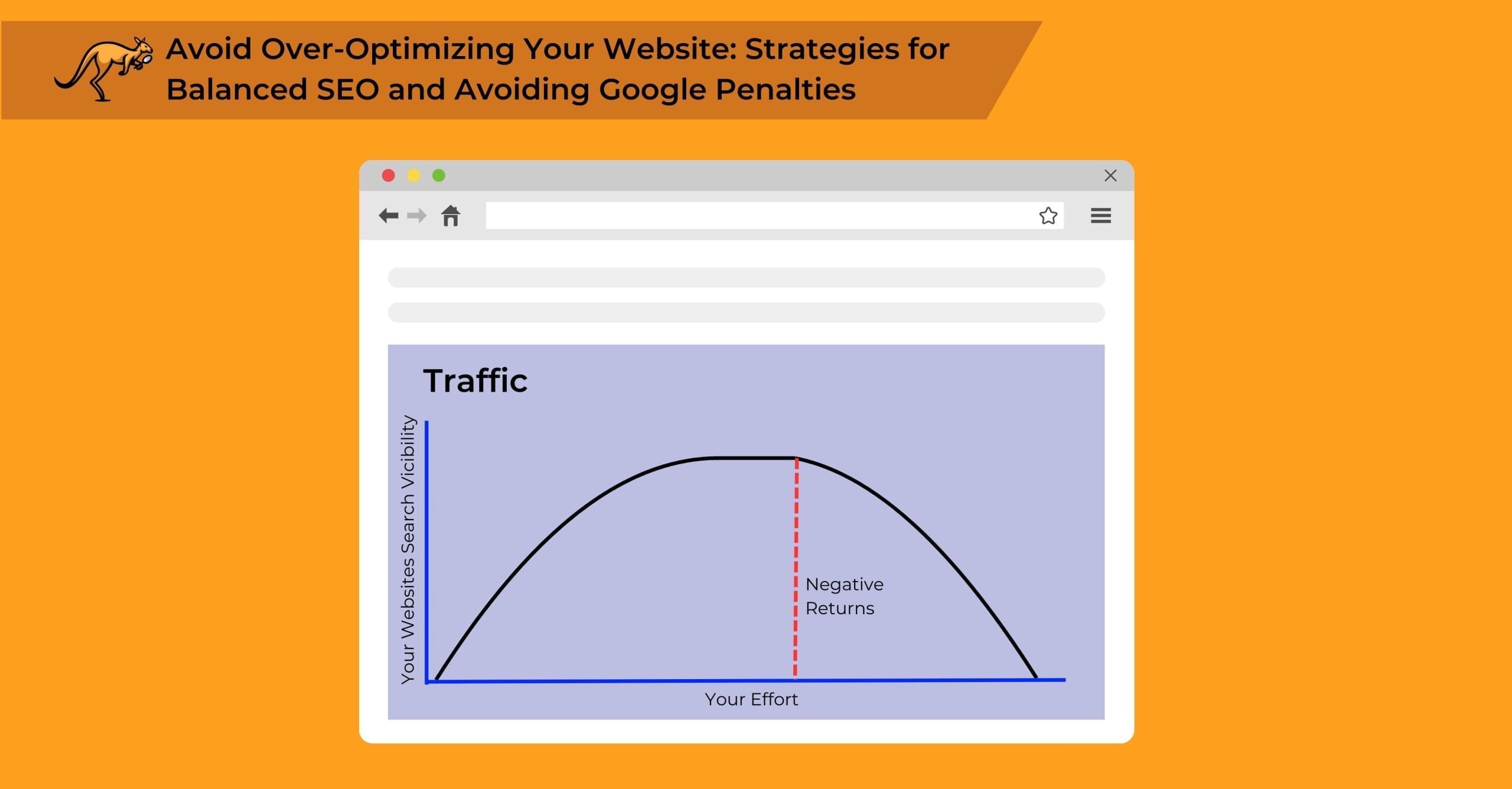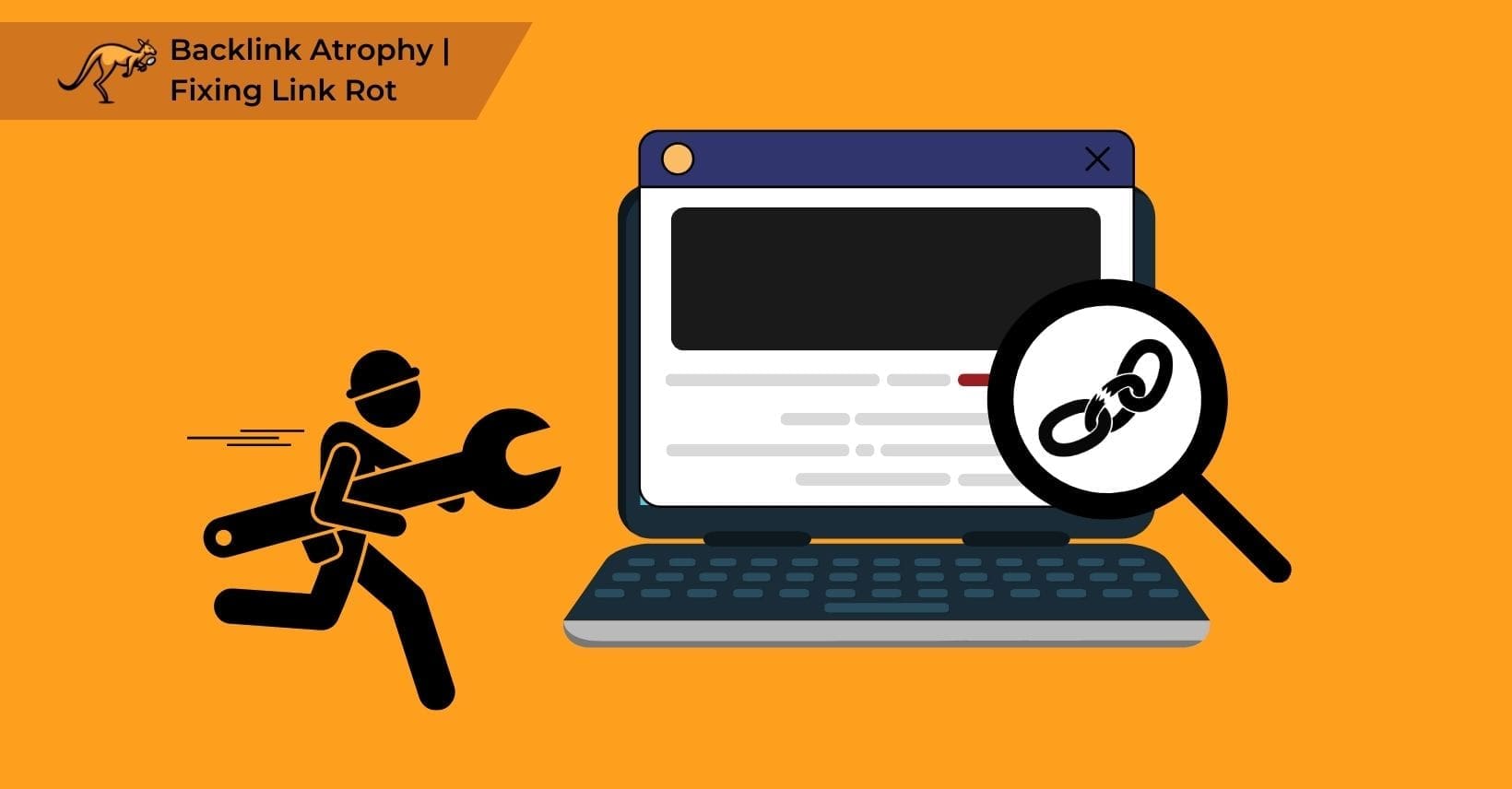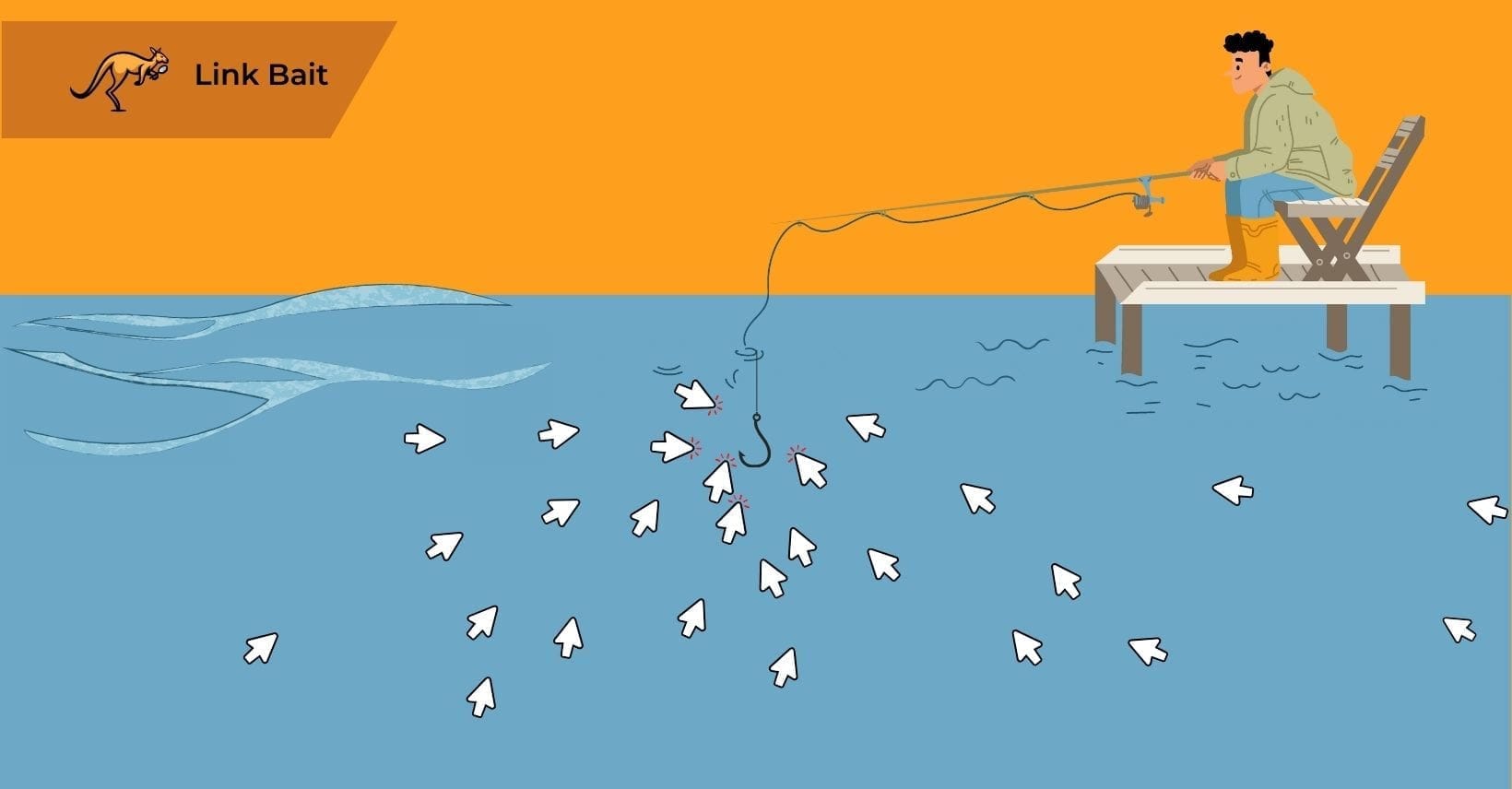For most people, search engine optimization is about exactly that – optimization.
While enhancing your SEO may seem beneficial, excessive optimization can inadvertently damage your site’s search rankings. This phenomenon of over-optimization presents a paradox: Too many supposed improvements can actually hinder your performance in search engine results. Understanding this issue leads us to explore the historical context in the next section, where we will delve into how past SEO practices allowed for such excesses and the lessons learned to prevent similar pitfalls today.
Why was Over-Optimizing Search Engine Optimization Possible Years Ago?
A long time ago, search engine optimization had very few restrictions applied to it. Over-optimization was the norm, and since there was no such thing as “too many” SEO improvements, sites were free to use black-hat tactics like keyword stuffing and link-spamming.
Naturally, Google was not happy with how this impacted search engine results pages and wanted to push users to avoid over-optimization. This means that they took direct measures to prevent it. For example, Google devalues footer links to prevent a keyword-stuffed footer from having any effect.
Initially designed to counter exact SEO abuses, Google’s algorithms broadly target over-optimization, treating it as a key metric. Consequently, websites that are over-optimized often experience diminished performance. This shift highlights the evolving nature of search engine criteria and underscores the importance of adhering to best practices.
Understanding these dynamics leads directly into the next discussion, in which we will explore the mechanisms behind search engine penalties and their impact on website performance.
How Does Google Penalize Keyword Stuffing and Over-Optimization?
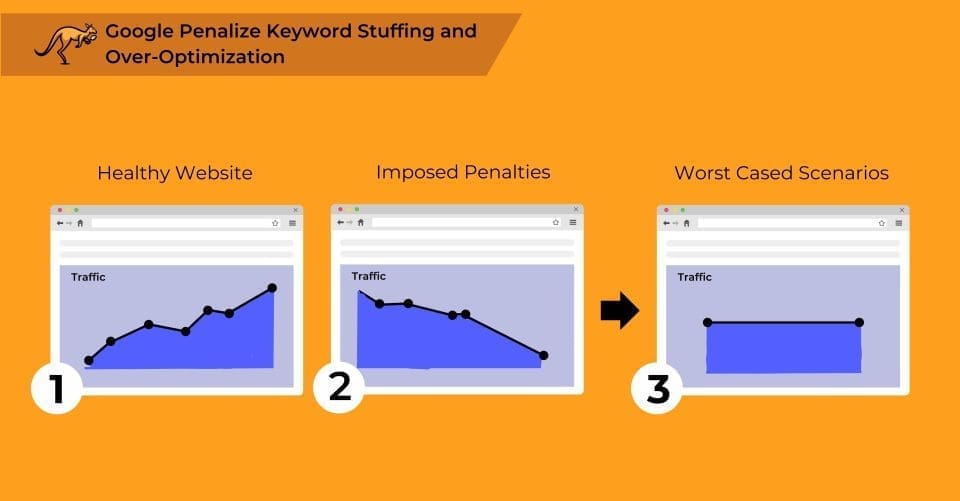
When Google devalues a site’s links and penalizes its SEO, they are basically deciding that the site in question will receive minimal crawler recognition until the website is re-reviewed. For one website, this might be until they apply for another check – for another website, this might be a death sentence that kills their online business.
Google wants to put good sites that deserve to rank highly on their search engines. A site that is not playing by the rules is a site that they are not willing to work with, so using these techniques usually leads to massive penalties for your SEO.
The penalties for over-optimization can severely hinder your website’s ability to rank well and connect with your target audience, underscoring the importance of adopting a balanced SEO approach.
To safeguard your site from these risks and ensure it remains effective in attracting the right visitors, knowing the best practices that prevent excessive SEO tactics is important. This leads us to the next section, where we will explore exact strategies to maintain effective optimization without crossing into detrimental over-optimization.
How Can I Avoid Over-Optimizing Our Website?
Most cases of an over-optimized site come from two places: penalties by Google or over-optimization so precise that it does more harm than good.
In either case, below are the important tips to know how you can avoid over-optimization before it starts to negatively impact your SEO efforts.
Don’t Use Keywords-Stuffing
Keyword stuffing was the entire reason that Google took a stance against over-optimization in the first place, and with good reason. Keyword stuffing is when you perform keyword research and then simply dump as many resulting keywords as possible into any pages you can.
Even if you keep switching up the keyword variations and follow positive SEO techniques, Google can still see the bigger picture. Your audience might not notice that your website has a keyword placed every ten words, but Google will.
This can actively harm your SEO results and make your attempts to gather keywords worthless, so make sure to use your keywords carefully. Occasional anchor text and keywords are fine, but a site that is mostly an excuse to place keywords on a page will not last long.
Avoid Keywords-Dense URLs
While keyword-rich anchor text is great, some site owners move away from the balanced brand-identity URL and stuff their URLs full of any keywords they can find. This gets much worse if it is obviously optimization rather than just the brand name.
For example, if your business is named “Best Free Furniture,” then it is not over-optimization to choose the URL “bestfreefurniture.com”. However, if your business is named “Specialist Furniture,” then “bestfreefurniture.com” is a clear case of over-optimization.
Google notices this and does not appreciate it. This kind of URL is clearly chosen to grab as large a target audience as possible by putting keywords in the URL, even though they do not match any of the site’s technical SEO details. Naturally, this often gets your website heavily penalized.
Unless you are just sticking to your brand, your keywords should be your website name, not a keyword mess designed to attract high traffic or a certain user intent. Keeping your URL simply appropriate to your website is the best way to avoid search engine penalties.
Stop Overthinking Internal Links
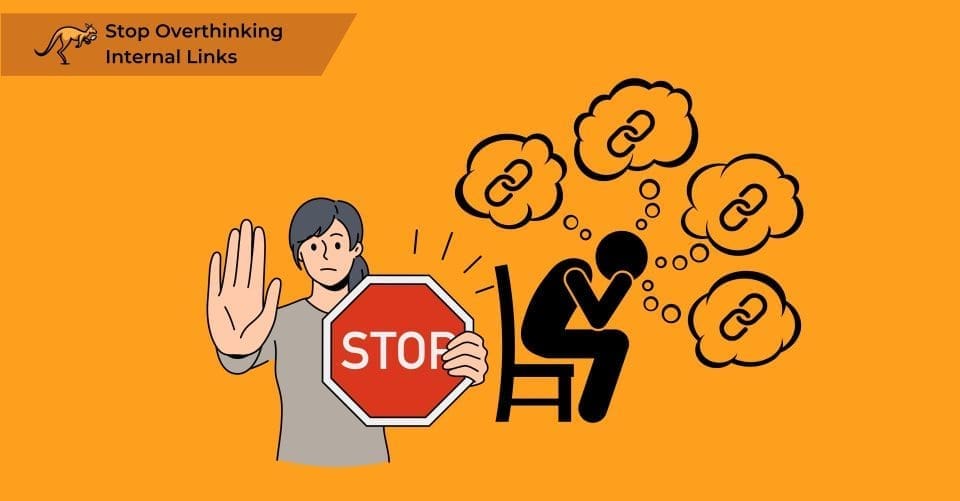
Internal linking is great, so you might think that using the same keyword-rich anchor text that you might use in external links would be good, too.
However, over-optimized internal links are often going to damage the link profile of your entire domain, especially if you over-optimize every internal link with anchor text keyword stuffing.
When you create internal links like this, you are giving Google a reason to mark you for penalization. Having too many internal links like this massively increases the keyword density of your site, and not in a good way.
If you want to use keywords, make sure that they are used sparingly and that you are not filling your site with the same target keywords over and over again. Ideally, you want to keep these keyword links exclusive to situations where they directly match the URL, such as a site’s name.
Avoid Irrelevant Keywords
Non-relevant keywords are naturally going to be ineffective. However, trying to actively gain traffic from irrelevant links pointing at your website will eventually get you penalized.
SEO is all about using keywords that are relevant and appropriate. Having a high keyword density that includes a lot of irrelevant keywords will, to search engines, look like keyword misuse and/or gaining whatever links you can find regardless of relevancy.
While Google will excuse a few non-relevant keywords here and there, having too many keywords that do not fit with your niche is a surefire way to have your search rankings slashed.
Stop Focusing on Surface-Level Links
Pointing all of your internal or external links to your top-level navigation pages can be a problem. In general, there are two kinds of links – start page links that go to the home page or category pages and deep internal links that go further into the site.
In general, your healthy ratio should be around a 50/50 split, using different types of quality content and keywords to get different links pointing at each.
However, some site owners like to point the majority of their links at the top pages or focus all of their natural linkability there. This means that most of the links are going to a select few pages, very few of which have any actual engaging content on them.
It is important to seek out more deep internal links. Not only are deep internal pages more naturally linkable in most cases, but they benefit from the keyword value more and are usually the pages that impact the conversion rate the most.
Don’t Use Bad Headings
Using more than one H1 heading tag on a page is a huge no-no. These tags are meant for the main heading on a page, with every other header on the page needing to be H2 or below – the more H1s you use, the more penalties you should expect to see.
In general, poor heading usage will massively harm your site’s technical SEO. Web pages with no headers (or an excessive amount of page headers) will usually rank worse because of the way that Google handles content.
You also can’t get away with keyword stuffing in headers, so do not put too many keywords in the H1 if you can help it. Google will notice if your page seems to have an unnaturally long title that’s full of obvious keywords.
Stop Making Toxic Links
While having bad links pointing at your site hurts your optimization, linking to those bad sites is even worse. While some site owners assume that linking to other sites is part of most good SEO practices, you want to choose your target sites carefully, especially considering your website competitors.
Attempting to forge connections by excessively linking to a broad array of low-quality sites can be detrimental, as Google recognizes these poor-quality links and may penalize your site. Such penalties underline the importance of strategic link-building and the avoidance of over-optimization. This critical need for balance leads us to the next discussion on Planning Around SEO Over-Optimization, where we will explore effective strategies to maintain SEO quality without triggering penalties.
Planning Around SEO Over-Optimization
Over-optimization is a huge problem that was even worse years ago, but now it is more like a part of Google’s guidelines. If you want to get ranked properly in search results, then you need to ditch these over-optimization habits as soon as possible.
SEO is about optimization, but only up to a certain point. Quality content and a solid link profile can push a site higher in the rankings without any mess or long-term problems, but misusing keyword-rich anchors or trying to mislead Google bots is only going to get your website penalized.
Always plan within Google’s guidelines. The best SEO practices are the best for a reason, and your over-optimization stems from using techniques that Google simply was not willing to permit. They are not sneaky loopholes or clever tricks; they are not allowed on the service.
That being said, focusing on optimization is not a bad thing. Whether you are tweaking your link profile to remove bad backlinks or adjusting the exact URL of each page to better suit your SEO goals, you can see some improvements to traffic and clicks with even the smallest changes.
The biggest problem is when you begin to do things that go against the spirit of search engines – mainly, presenting users with the best legitimate content for their query.
Over-optimization refers to practices like creating keyword-dense URLs or excessive keyword stuffing on your site. Utilizing SEO tools such as Yoast SEO or data analytics platforms like Google Analytics is advisable, alongside diversifying your SEO efforts on multiple platforms, including social media.
These balanced approaches can enhance your SEO without crossing into over-optimization. However, if your strategies have tipped into excess, addressing these issues promptly is important. Next, we’ll explore the steps to correct over-optimization and realign your SEO strategies effectively.
What If I Have Already Over-Optimized?
If you suspect that you have accidentally (or intentionally, without realizing the risks) optimized your site too much with these methods, then you need to go into high alert before a crawler bot re-runs through your website.
Most Google analytics details update whenever crawlers check your website again or when the algorithm sees a major change that requires all sites to be re-ranked. This means that you need to try and fix these issues before your site is crawled again because this will be when the penalties are usually applied.
Run through your recent SEO work and check them against Google’s guidelines, as well as some of the details listed here. If you worry that you have used banned SEO techniques or black-hat methods of optimizing your site, make sure you remove them (and ideally replace them with a less risky alternative).
No matter what kind of SEO methods you use in the future, make sure that they are not set up to do the exact opposite of what Google wants. Even if it might give you a huge boost of traffic in the short term, your site will suffer horribly in the long term and potentially even be delisted from search results entirely.
SEO is something that you are doing to work with Google and other search engines, not against them. If you try to fight against their intended way of approaching SEO or actively violating their rules, then you are going to be penalized as you might expect. Even the way you use a keyword can apply here.
Your SEO methods should all be above board and in line with what search platforms are okay with. Do not fall into the trap of assuming that anything is fine as long as it optimizes your site, or you might accidentally destroy your rankings as a result.
Summary: Navigating SEO Optimization Without Overstepping
Effective SEO is crucial for enhancing your website’s visibility, but it’s vital to avoid over-optimisation pitfalls. Practices such as keyword stuffing, using keyword-dense URLs, and creating toxic backlinks can lead to penalties from search engines like Google, which can severely impact your site’s ranking and visibility.
To maintain a balanced SEO strategy, focus on creating quality content, using relevant keywords judiciously, and building a healthy link profile. Regularly review your SEO practices against Google’s guidelines to ensure compliance and prevent potential penalties. If your strategies have ventured into over-optimization, take immediate steps to realign them with best practices. This approach ensures your SEO efforts support sustainable growth and a strong online presence without risking penalization.
